
Recently on Cyclingnews.com |
Tales from the Peloton , October 3, 2008
Hell of the south
The Volta a Portugal may be one of Europe's oldest stage races, but with eight of this year's starting line-up linked to Operación Puerto, its recent reputation has been murky. Procycling's Daniel Friebe reports on Portuguese cycling's fight to clean up its act.
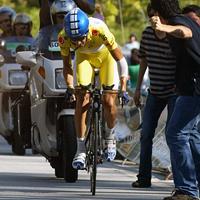
|
Take a Tube train anywhere in London this summer and, at some point on your journey, you're almost bound to see a vast white and blue poster advertising Portugal as a tourist destination. The concept, to be honest, isn't the most captivating or original: one version features a giant portrait of the former Chelsea football manager and de facto Portuguese ambassador José Mourinho above a contrived-sounding quote about the country's wine; another uses the same format, only this time it's Manchester United star Cristiano Ronaldo raving about Portuguese golf courses; fado singer Mariza pouts from another. And so on and so on.
It's fair to say that a similar campaign based on Portuguese cycling would make less flattering, though perhaps more interesting, reading. You wouldn't even have to make up the quotes. In the place of Mourinho, you could, for instance, go with ex-pro Carlos Da Cruz and his 2007 admission – "Let's say the future of cycling isn't in Portugal" – complemented with suitably knowing smile. Or how about ditching Ronaldo for Gilberto Simoni, and the puff about greens and fairways, for the Italian's comments in 2005 about the Tour of Portugal – "Going to that race is the worst thing that a rider can do"? Or, failing that, Pat McQuaid and any of his numerous outbursts on the continental divide between northern and southern Europe and their attitude to doping?
It wasn't always like this, of course. Cycling in Portugal once thrived. The Volta a Portugal was first staged in 1927, predating the Vuelta a España by eight years. Between the 1940s and early 1980s, the race even stretched to three weeks. Even now, spanning 12 days in the middle of August, it is the fourth longest race on the European calendar behind the Vuelta, the Tour de France and the Giro d'Italia.
"Some countries consider Portugal a 'haven for doping', but that reflects their total ignorance. On a European level, Portugal has nothing to learn from other countries – more often, it's them who should be learning from us."- Portuguese anti-doping organization scientist Luis Horta |
According to race director and three-time former winner Joaquim Gomes, three million people out of Portugal's total population of 10.6 will have seen this year's race by the time it concludes with a 31km uphill time trial to Felgueiras on the last Sunday of August. Gomes tells us this on the fourth evening of the race, in a typically well-appointed press room in Viseu, no more than a kilometre from the town's ancient cathedral. Like his race, Gomes seems to exude good health. He's now well into his forties, but his eyes sparkle and his skin glistens. Think Christian Prudhomme after three weeks in Cannes.
When Gomes tells us that "Portuguese cycling suffers from the same problem as cycling in general, in other words a strong connotation with doping", he's right, but only to a point. Because while almost no nation has been spared the devastation reaped by countless doping scandals over the past decade, few have ended that decade with quite as many stains on their reputation as Portugal. Or with quite as many tarnished riders populating their teams. It would be both a cliché and an gross exaggeration to say that the startlist of this year's Tour of Portugal resembled Doctor Eufemiano Fuentes's client list circa May 2006, but it would also be naive to suggest that thought didn't cross a few minds.
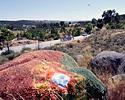
|
Francisco Mancebo, Santiago Pérez, Eladio Jiménez, David Blanco, Isidro Nozal, Rubén Plaza, Koldo Gil, David Bernabeu... all figured in the Operación Puerto police files, and all lined up in Portimão for the Volta's 6.4km prologue on August 13. It just so happened that one of the infamous eight – Rubén Plaza – also went on to win.
This year's Volta had already been overshadowed, and the sport in Portugal disgraced like never before, three months before Plaza pulled on his race leader's yellow jersey. One Monday afternoon in May, while the cycling world's eyes were trained on the Giro d'Italia, police raided the headquarters of one of Portugal's leading teams, LA-MSS, as well as the homes of several of its riders. The Portuguese media quoted police sources as saying that products and apparatus which "could be used for doping practices" were among the material seized. The judicial investigation that ensued – and which is still ongoing, shrouded in secrecy – appears to confirm those early reports, as would the Portuguese federation's decision to provisionally suspend five LA-MSS riders – Tiago Silva, Claudio Faria, Rogério Batista, Pedro Cardoso and Afonso Azevedo – as well as masseur Paulo Silva, Spanish doctor Marcos Marino Maynar, directeur sportif Manuel Zeferino and president Luís Almeida.
The LA-MSS riders spared by the scandal might still have competed at the Volta, but Gomes and his colleagues decided they weren't welcome. We ask him whether it was a difficult decision, and he pauses for a second. "It was a difficult decision, because there were lots of factors justifying their presence in the race," he says finally. "At the same time, though, there was one thing outweighing all of those factors, and that was an investigation into organised doping in the team.
"What's happened in cycling over the past few years has demanded a change in mentality," says Gomes, who himself seems to have undergone that change after some controversial invitations in 2006 and 2007. "A lot of people have made that shift, but some haven't. Zeferino has been a friend of mine for 20 years. I consider him a nice guy, intelligent as a person and as a manager... But some people still have a hard time understanding that doping in sport is corruption, plain and simple."
Earlier in the day, at the start of stage four in Guarda, the same topic had come up in conversation with Gomes's right-hand man, Ricardo Scheidecker. "It was a decision we had to make, but it wasn't easy," he'd grimaced. "LA-MSS was a potential winner of the race, and now we're moving towards the north, where that team has a big following. We'll see what happens..."
If the Volta a Portugal has proved a hard sell for directeurs sportifs sounding out riders for a 12-day trip to the Iberian peninsula, one of the reasons has traditionally been the weather. In case you hadn't noticed, Portugal in August is hot. Very, very hot.
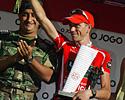
|
Stage three of this year's race looked set to be just another torrid day on the solar panels disguised as dusty hills due north-east of Lisbon, but it turned out to be gruelling for different reasons. First, or rather last, there was the toughest finish of the race, a formidable 27km climb to the highest point in mainland Portugal and the country's only ski resort, the 1912m Alto da Torre. Then there was the icy fog enveloping the Estrela da Serra mountain range as the peloton began its approach. Then there was the navy-blue armada named Liberty Seguros.
At a clearing 9km from the summit, perhaps 20 carloads of hardy fans shivered beneath blankets and winter coats, waiting for the leaders to arrive. The first rider to pass was Rui Sousa of Liberty Seguros – a survivor of the stage's early break. Then, just over two minutes later, came Blanco of the Portuguese Palmeiras Resort-Tavira team, followed by another threesome from Liberty, including Koldo Gil.
The next five were Plaza, Mancebo, Pérez, another rider from Liberty, then Juan José Cobo of Scott-American Beef, formerly Saunier Duval. Garmin's climbing prodigy Dan Martin wheezed through the mist a few moments later.
Sousa held on to win, and only runner-up Blanco of Palmeiras Resort-Tavira and Operación Puerto would prevent a Liberty Seguros clean-sweep of the top five. On general classification, Sousa now led and his team accounted for four of the top six riders.
Liberty Seguros, you'll remember, was once the name and sponsor of a Spanish team managed by Manolo Saiz. In 2006, that team and its controversial figurehead were sucked into the vortex created by Operación Puerto, only to morph and resurface as the Kazakh-funded Astana, though their Portuguese reincarnation has little in common with Saiz's old team.
Except their insurance broker sponsor, that is. And former Saiz acolytes Nozal and Gil. And one or two raised eyebrows. Liberty Seguros is now one of seven Portuguese teams registered in the International Cycling Union's Continental division. Scheidecker says their budgets range from "around half a million euros to probably slightly over a million in Liberty's case". As it does in Portugal's national sport, football, one club and one blood-red uniform stands apart from the rest in terms of wealth, history and popularity: Benfica of Lisbon. Their annual running costs edge two million euros. They are also Portugal's only Professional Continental division team.
The morning after Rui Sousa's victory on the Serra da Estrela, Portugal's number one sports newspaper, A Bola, juxtaposes their account of the Liberty-led genocide with an innuendo-laced column from Benfica veteran Candido Barbosa. "[Liberty Seguros's] domination surprised me," Barbosa writes.
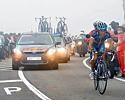
|
It's fair to say that a veiled scepticism similar to Barbosa's is common among the seven non-Iberian teams competing in Portugal. But scepticism – and not cynicism – is the word. "There are one or two who might be up to their old antics, but it's not too bad," shrugs Pat McCarty of the Garmin team. "It's good, hard racing. The hotels are great. Sure, they are some fast guys, but you have to give them the benefit of the doubt," adds McCarty's team-mate Tyler Farrar.
Ironically, it's Dan Martin – the most competitive of all of the foreigners in Portugal – who is the Garmin rider seemingly most shell-shocked by the power of the local teams. Martin, McCarty and Farrar's directeur sportif Johnny Weltz says that riders' typical reaction on being summoned to Portugal was once "They don't like me any more," but that's now changed. Garmin now race regularly here and, says Weltz, view the Tour of Portugal as an ideal induction to major tours, with its 12 days, variety of terrains and even a rest day at the end of the first week. "If you go in with objectives, preparation and a positive attitude, the guys realise that racing here can be fun. The weather's awesome, the crowds are good, the organisation's very good..."
We eventually coax Weltz into an assessment of Liberty's procession the previous day. Like almost everyone else, he seems to hesitate between diplomacy, scorn and speculation. "Portuguese guys are good bike riders. But we see LA-MSS, we hear things, and we can't ignore that. It's common sense. We know how cycling is today, and you look at the Tour de France. A couple of days from the finish, you still had five guys who could win the Tour. That's cycling.
You don't see these days when eight guys just kill a race from one end to the other. That's not healthy..."
Barloworld DS Valerio Tebaldi's view is similar, though he also makes the point that, "If you look at all stage races, it's the same – the Italians go well in Italy, the French in France, the Spanish in Spain." Tebaldi adds, "You also have to remember that it's the last race of their season, whereas we finish in two months' time. The Portuguese stake everything on this race. You have to have faith in the tests, otherwise there's no point being here. It's the same with the Operación Puerto riders.
If you look at yesterday's results, you've got Santi Pérez, Mancebo... the list goes on. I'd be in favour of life bans if someone cheats, but as long as that's not the rule, you have to accept it. Also, I see changes in the race and the testing from previous years. It'll still take them time, but things are changing."
There's something of Don Vito Corleone about Portuguese Cycling Federation (PFC) president Artur Lopes. Lopes's detractors might say the two men preside over similar organisations, but that's nonsense. It's something else. That quiet, slightly chilling air of distinction. The voice. The mannerisms. It's quite unnerving.
Lopes leads us into a quiet corridor behind the presentation podium area in Guarda to explain how he's attempting to protect and restore Portugal's standing as a cycling nation. He says that when he took over the presidency in 1993, the federation had around 1,000 licensed riders, whereas now that number exceeds 8,000. He reminds us that Portugal are currently dominating the UCI's Under-23 Cup of Nations with just the Tour de l'Avenir still to ride.
Lopes knows, however, that it's results in the anti-doping field that the rest of Europe wants to see. To this end, he's working closely with Portugal's government anti-doping agency (CNAD) to toughen up controls and other dissuasive measures. He said earlier this year that the proliferation of Operación Puerto riders in home teams was "bad for the image of Portuguese cycling", and he concedes that's still the case today.
"The problem is that, as our teams see it, they're riders who've had good results in the past, and they come at a very low price," he says. "I don't like it but I can explain it.
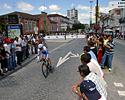
|
In any case, I can tell you that I'm on the board of the CNAD, and this year the CNAD obtained permission from the UCI to test these foreign riders from Portuguese Continental teams out of competition and even when they're not in Portugal. I make no secret of the fact that this issue worries me."
Lopes goes on to comment on another prickly topic – the number of foreign doctors serving Portuguese teams. This issue has recently been brought into sharp focus by University of Extremadura doctor Marcos Maynar's involvement in the LA-MSS scandal and his subsequent suspension by the PFC. Maynar, some will recall, is also the doctor recently accused by German TV channel ARD of peddling his services as an accessory to dope-test circumvention to up to 10 leading pro teams. Maynar answered the allegations with a stiff denial and outburst worthy of Manolo Saiz: "Since Jan Ullrich tested positive, the Germans have wanted to shit on the Spaniards."
Lopes says that, from next year, Maynar and a gaggle of other Spanish and Colombian doctors working for teams like Liberty Seguros and Mancebo's Fercase-Rota dos Móveis could be banned "unless they sign up to the Portuguese doctors' association's rules of practice". He's also quick to scotch rumours that the original Dr Evil, Eufemiano Fuentes himself, has found sanctuary in Portugal. "Fuentes doesn't work in Portugal," Lopes says without hesitation. "I'm aware of the rumours, but based on what I've heard, Fuentes is in the Canary Islands or somewhere like that, and he's never worked a day with a Portuguese team. I think the rumour came about because someone said his sister [Yolanda, who also figured prominently in the Puerto investigation] worked a few days on the Tour of Portugal last year, for a Spanish team. But I don't know which one..."
Over the course of our three days in Portugal, we have several conversations like our 15-minute audience with Artur Lopes. The impression that emerges is one of a cycling nation on the margins of the sport's ethical revolution, much in the same way that Portugal has often found itself nibbling at the edges of Western Europe's burgeoning wealth and political might. "You have to remember that Portugal was run by a dictatorship [the right-wing Estado Novo] until 1975, and that, in many ways, we're still 20 years behind the rest of Western Europe," says Tour of Portugal director Joaquim Gomes. "You should have seen us trying to prepare and compete with the foreigners at the Tour of Portugal in the 1980s: it was like going to Iraq with a Kalashnikov..."
It would be wrong, though, to assume that Portugal, its cycling community and its attitude to testing live up to a backward, naive and possibly corrupt stereotype. Bear in mind, for instance, that Portugal's CNAD was founded in 1977, among the first government anti-doping agencies anywhere in the world. Consider also that World Anti-Doping Agency director general David Howman recently praised Portugal's efforts in the war on doping and the standards upheld by the CNAD's laboratory in Lisbon, destination for the samples collected on the Volta.
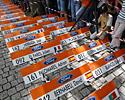
|
One individual – a slender, dark-haired scientist named Luis Horta – must claim a lot of the plaudits for what credibility Portuguese sport does now offer. A key proponent of the biological passport now adopted by the UCI, Horta was also one of the architects of a major new testing and whereabouts programme introduced in agreement with the Portuguese domestic teams at the start of 2008. When, a few months in, the association of Portuguese riders objected to the level of surveillance and testing involved, it was not only a good gauge of the shift in mentality still required in the Portuguese peloton, but also an opportunity for Horta to underline his determination. He promptly pulled the CNAD's backing from the agreement, condemned the riders' attitude and vowed that they would now be subjected to even more rigorous, targeted testing.
Horta's resolve is evident in the rhetorical question he asks on the eve of the Volta: "Why are there so many Spanish doctors in Portuguese teams? Portugal has never had so many graduate sports doctors..." It's also clear when, on day three, the CNAD dispatches its men to randomly test Mancebo's Fercase-Rota dos Móveis team, Blanco's Palmeiras Resort-Tavira, the Italian Flaminia squad and Extremadura-Ciclismo Solidario of Spain – and continues at a similar rate throughout the Volta. Horta had stated on the eve of the race that third-generation EPO or Micera would be among the substances detectable in the CNAD's tests.
"Some countries consider Portugal a 'haven for doping', but that reflects their total ignorance," Horta said recently. "On a European level, Portugal has nothing to learn from other countries – more often, it's them who should be learning from us. Interpol knows what's happening, in terms of drug trafficking, and our country has never been identified as a hub of that kind of activity. What substances do arrive in Portugal are bought and sold in Spain..."
Horta, it appears, isn't the only one determined to purge Portuguese cycling of its unflattering and perhaps undeserved reputation. On the evening of the fourth stage in Viseu, one of the dozen or so local journalists working full-time on the race, João Santos of O Jogo newspaper, assures me that Artur Lopes "speaks more openly about fighting doping than any federation president I've ever heard". "I think he realises the need to fight doping, to fight it seriously, and he's proud of what his federation is doing," Santos says.
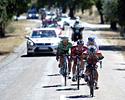
|
It's maybe dispassionate observers like Santos who can best assess the lay of the Portuguese land. It's therefore telling when he says that the LA-MSS scandal "exposed an open wound" in the sport in Portugal. "I don't think that getting rid of LA-MSS was the only objective," he says. "I think it was a warning to the other teams, although maybe they had more suspicions about LA-MSS than the others.
"I mean, what they did at the Vuelta a Asturias in May, when they had the top three riders in the general classification... The police raids were a logical conclusion after that." Santos says that reactions to the scandal have been intriguing. At the Portuguese Road Race Championships at the end of June, as Benfica's Candido Barbosa crossed the line in third place, he gestured angrily to suggest that it ought to have been second. The reason was that one of the LA-MSS riders who had escaped suspension, João Cabreira, had cruised to victory over a minute earlier.
Since then, it has been hard to prise any overt condemnation out of riders on other Portuguese teams, mainly, says Santos, because "we're still waiting for a Portuguese David Millar or Christophe Bassons" and "a lot of the riders still have friends at LA-MSS". That, we discover, is the case with by far the most famous Portuguese pro, former US Postal domestique-turned Benfica mainstay José Azevedo, who trots out the familiar cliché, "If they've done something wrong, it's right that they are punished, but not if it's just suspicions."
Azevedo, incidentally, also mentions that he'll retire at the end of the year and is likely to link up with current Benfica boss Orlando Rodrigues at the helm of either Benfica or a new team. We ask him if, in light of Portuguese cycling's current image problem, he might follow teams like Garmin and Columbia in instituting a strict independent testing programme. "I'd love to," he chuckles, "but that kind of thing costs a hell of a lot of money..."
Azevedo is the last person we speak to in Portugal, on the telephone as we make our way to Porto airport at the end of the Volta's only rest day. It has been an instructive three days, though we leave with the feeling that Oscar Wilde might have been returning from a similar assignment when he said, "The truth is rarely pure, and never simple."
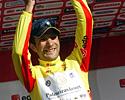
|
The LA-MSS scandal encapsulates our doubts. Websites are awash with speculation about what is justifiably being referred to as Portugal's equivalent of the BALCO affair, not least because, as was the case with the 2003 sting on the BALCO lab, the police raids are rumoured to have resulted from a tip-off by a rival team. Some say it was
Liberty Seguros, others claim Benfica. Adding to the intrigue, Liberty Seguros happened to be the insurer who cancelled LA-MSS's policy following the raids in May, effectively suspending the team even before the PFC had intervened. Benfica, meanwhile, are cast as the jealous rivals who struggled while LA-
MSS rampaged through the spring. In the wake of the raids, PFC president Artur Lopes has already had to deny LA-MSS manager Manuel Zeferino's claims that his organisation covered up a positive test by an unnamed Benfica rider.
If that all sounds very messy, add in the death of 27-year-old LA-MSS rider Bruno Neves in Classica de Amarante in May, just a week after his team's monopolisation of the Vuelta a Asturias and a fortnight before the drug bust. Initial reports said that Neves had died of crash injuries, but a police source later claimed that the fall had come about as a result of a heart attack. The truth may or may not emerge when the Portuguese police finally report back on their investigation into LA-MSS, possibly in September.
If Neves's death was a tragedy, another, on a smaller scale, is all of this murk and mystery around Portuguese cycling. Because three days are enough to figure out that there's more than enough material for that poster campaign, from breathtaking, sun-baked scenery, to brilliant racing and a few hardy individuals who are determined to prove that, while Portugal may not exactly be the future of cycling, cycling certainly has a future in Portugal.
The Volta's Top 10
Six riders from Portuguese teams, six Spaniards, four "survivors" of Operación Puerto, and one swashbuckling young climber in 22 year-old Daniel Martin. The 70th Volta a Portugal's final top ten standings looked like this:
Top 10 - Volta a Portugal 1 David Blanco (Spa) Palmeiras Resort-Tavira 39.49.35 2 Hector Guerra (Spa) Liberty Seguros 0.26 3 Rubén Plaza (Spa) Benfica 3.59 4 Juan José Cobo (Spa) Scott-American Beef 4.42 5 Koldo Gil (Spa) Liberty Seguros 5.39 6 Francisco Mancebo (Spa) Fercase-Rota dos Móveis 6.36 7 Rui Miguel Sousa (Por) Liberty Seguros 6.39 8 Candido Joaquim Venda (Por) Benfica 7.00 9 Tiago Machado (Por) Madeinox-Boavista 7.53 10 Daniel Martin (Irl) Team Garmin-Chipotle p/b H30 8.04
For more great in-depth features and interviews, subscribe to Procycling and find out more details about a free two-hour DVD featuring the best stages of the last 20 years of the Tour de France!
Photography
For a thumbnail gallery of these images, click here
Images by Pete Goding.
- Some rare exposure for two foreign teams, Felix Cardenas's Barloworld and Jean Demaret's Cofidis on stage two to Castel Branco
- Rui Sousa pierces through the fog en route to victory in stage three of the Volta to the Alto da Torre.
- A typically arid, evocative scene from the Serra de Lapa hills
Images by Volta a Portugal
- José Azevedo will likely retire from racing at the end of the year.
- 2008 Volta a Portugal winner David Blanco celebrates on the podium.
- 2008 Volta a Portugal winner David Blanco time trials.
- A Garmin / Chipotle racer time trials in Portugal.
- You might recognize some of these names. All were competing in the Volta a Portugal.
